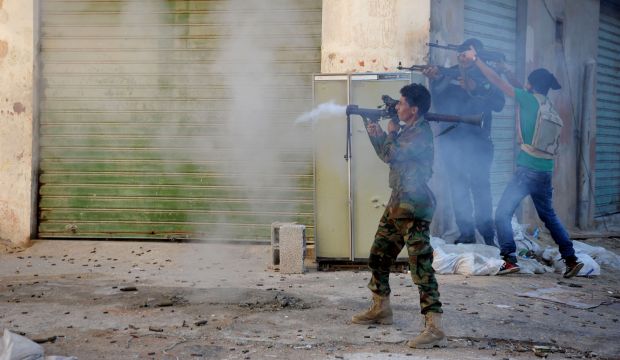Can anyone claim that they have been taken aback by the Islamic State of Iraq and Syria’s (ISIS) recent attempts to expand within Libya, or by Arab impotence towards stopping the constant collapse of the North African country?
Unfortunately, the answer to this question is well-known. The situation in Libya has gone from bad to worse in full view of the entire world.
It was obvious that the mixture of chaos, proliferation of weapons, and the political, tribal and factional infighting would repeat the Somalia or Afghanistan scenario and allow for the expansion of Al-Qaeda and ISIS or any other Islamist groups.
In fact, this has been the case in Iraq, Syria and, though differently, in Yemen. The Arab reaction to the deteriorating situation in Libya was not unexpected. Condemnations were issued and useless meetings were held as Libya fell victim to a debilitating power struggle and became an easy target for extremists. It has become habitual for Arabs to be impotent. And regional crises have been dealt with by referring them to a UN envoy to absolve the Arab League from its responsibilities.
Some, however, may argue that there have been Arab interventions in Libya in support of the “uprising” against Muammar Gaddafi. This is true, but such efforts were limited to a handful of Arab countries. Moreover, those cases of intervention were part of a cold war among some Arab states.
In other words, Egypt and the UAE intervened in Libya in order to prevent the North African country from falling into the hands of Islamist groups backed by Qatar, Sudan and Turkey. Egypt remains more concerned about the situation in its western neighbor than any other Arab country, particularly given its war on the Muslim Brotherhood. Should Libya fall into the hands of armed Islamist groups, Egypt would be fighting Islamists on two fronts: to the west in Libya and to the east in the Sinai Peninsula where extremists have stepped up attacks after declaring an alleged “Islamic Emirate” and pledging allegiance to Abu Bakr Al-Baghdadi and his so-called “Islamic state.” It is no secret that relations between Egypt and Hamas are not that great. Added to this is the Sudanese Islamists’ unfriendliness towards Cairo even if things on the surface point to a potential rapprochement between the two governments. A few days ago Brotherhood members and leaders, including Hassan Al-Turabi, took to the streets of Sudan and issued statements and even warnings to express their condemnation of the rulings Egypt recently issued against its ousted president Mohamed Mursi and some other senior Brotherhood members.
The consequences of the conflict in Libya will not be limited within its borders. The situation in the North African country will send direct consequences to Tunisia and Algeria and possibly to Morocco and Mauritania. Islamism in the Maghreb, as well as across the Arab world, remains a thorny and complex issue. And extremists continue to haunt security and political agencies there.
Europe also seems to be preoccupied with the deteriorating situation in Libya and the potential political and security threats it poses to its southern borders. The chaos in Libya has made it a hub for human trafficking networks that ship thousands of desperate migrants on death boats that either reach European shores or sink in the Mediterranean. Media coverage of the crisis has mobilized public opinion in Europe, prompting governments there to address the issue of immigration, which became more pressing as Europe faces increasing economic and social problems. There are also increasing concerns about ISIS’s exploitation of the waves of migrants to sneak fighters into Europe in order to carry out terrorist operations there.
This is why some in Europe are calling for military intervention in Libya. The most recent call came from Spain’s Minister of Defense Pedro Morenés who a few days ago called for the anti-ISIS international coalition to expand its operations beyond Syria and Iraq, particularly in Libya. Morenés referred to the recent developments in Libya where ISIS has made gains in the cities of Derna and Sirte. Such calls are still limited in number; nevertheless, the situation in Libya remains subject to change should ISIS increases its influence on the ground.
Unfortunately, the situation in Libya could worsen unless quick and serious steps are taken on two fronts: supporting the current UN-sponsored talks, and stymieing ISIS’s advance in the same way the group’s progress has been halted in Syria and Iraq. Capable and concerned Arab states must play a role on both fronts. Hesitation would only further complicate matters.
